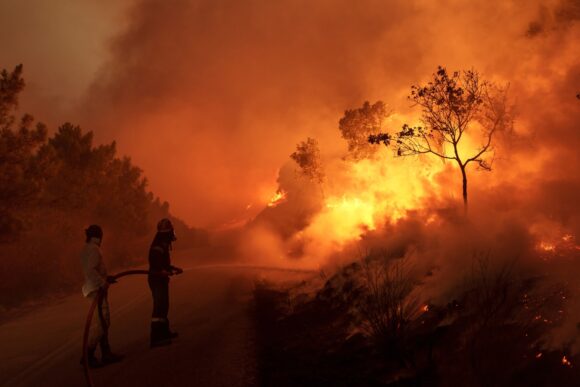Europe will be 3C hotter even if the world succeeds in limiting global warming to 1.5C above pre-industrial levels, bringing with it the heightened peril of extreme weather and trillions of euros of damages to the economy.
Such climactic hazards will be felt more acutely in southern Europe, but a “conservative estimate” shows that climate change could reduce economic output in the European Union by around 7% by the end of the century, according to a draft communication from the European Commission seen by Bloomberg.
If global warming goes beyond the 1.5C threshold, it could reduce the bloc’s GDP by €2.4 trillion between 2031 and 2050, the draft shows.
Here’s how the EU plans to do better at managing its climate risks:
Better Data
The bloc will use satellites to better assess risks like wildfires. It will also access data that will allow policymakers to simulate future sea level rise, coast erosion and changes in biodiversity over decades come. Alert systems for natural disasters will be improved using the Galileo satellite services next year.
The commission will also step-up efforts to combat disinformation on the climate.
Resilient Finance
The EU will set minimum climate resilience requirements for all EU spending. Public procurement, which accounts for 14% of the bloc’s GDP, needs to better consider risks from extreme weather, through auctions for wind and solar power.
The European Central Bank, the European Investment Bank as well as private financial institutions will join a committee set up by the commission to help finance climate resilience.
Nature’s Role
Future-proofing EU food production will be a priority for the commission and the executive body will conduct a study on adaptation in agriculture by the end of next year, according to the draft document.
Creaking Infrastructure
Europe’s buildings, transport and energy infrastructure are all at risk. Only a handful of member states have laid down plans for how to boost resilience of their power grids. Building standards will also need to be strengthened in order to deal with extreme weather events.
The EU is hoping to host an international symposium on managing Global Climate Risks in 2025, bringing together government representatives, financiers, and expert organizations.
Photograph: Firefighters and volunteers work to extinguish a wildfire near Dikella, Greece in August 2023. Photo credit: Konstantinos Tsakalidis/Bloomberg
Topics Europe Climate Change
Was this article valuable?
Here are more articles you may enjoy.



 Q4 Global Commercial Insurance Rates Drop 4%, in 6th Quarterly Decline: Marsh
Q4 Global Commercial Insurance Rates Drop 4%, in 6th Quarterly Decline: Marsh  Florida Engineers: Winds Under 110 mph Simply Do Not Damage Concrete Tiles
Florida Engineers: Winds Under 110 mph Simply Do Not Damage Concrete Tiles  How One Fla. Insurance Agent Allegedly Used Another’s License to Swipe Commissions
How One Fla. Insurance Agent Allegedly Used Another’s License to Swipe Commissions  Nine-Month 2025 Results Show P/C Underwriting Gain Skyrocketed
Nine-Month 2025 Results Show P/C Underwriting Gain Skyrocketed 

